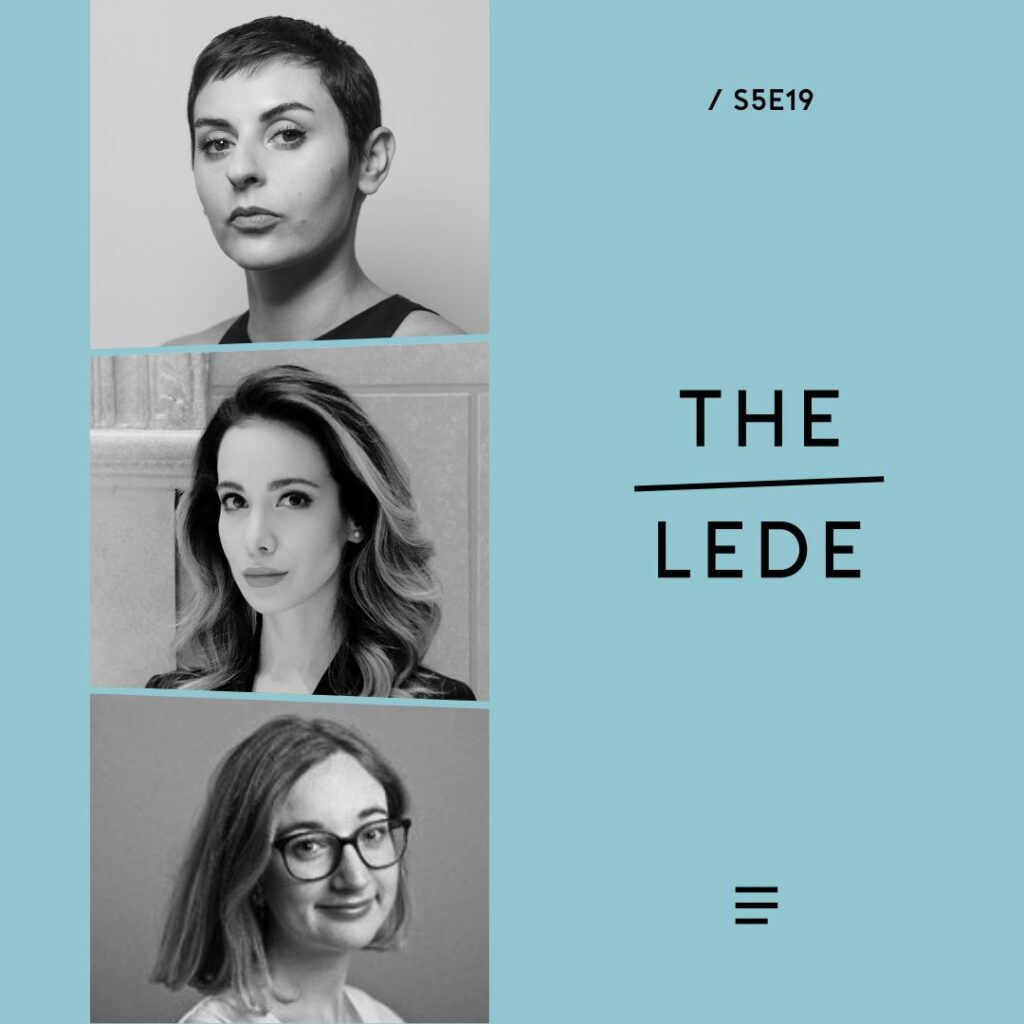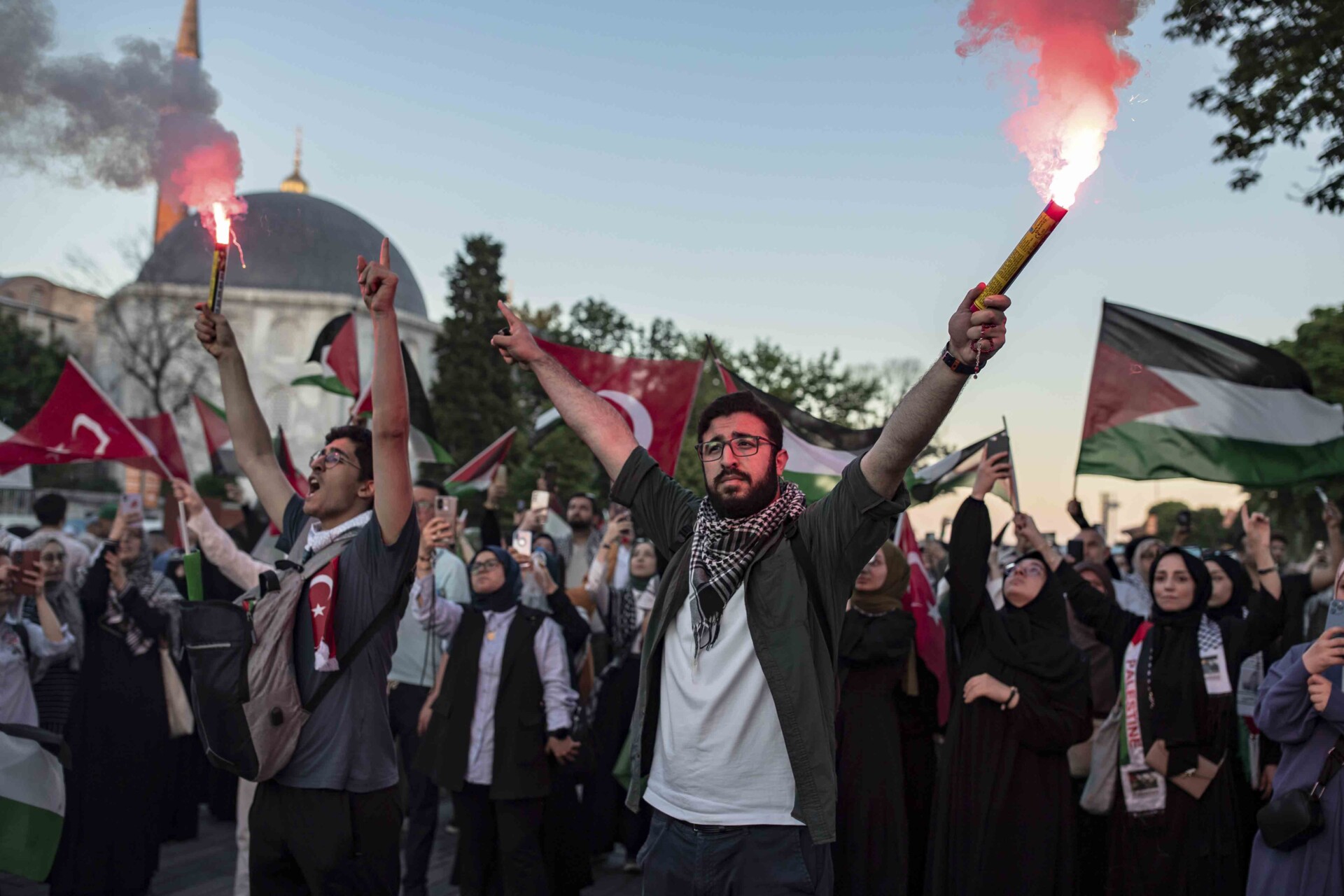Hosted by Faisal Al Yafai
Featuring Ruth Michaelson, Chloe Cornish and Tara Kangarlou
Produced by Finbar Anderson
Listen to and follow The Lede
Apple Podcasts | Spotify | Podbean
While the conflict in Gaza plays out on a tiny strip of land a fraction of the size of Los Angeles, its impact on the wider Middle East region has been huge.
With this in mind, New Lines’ Faisal Al Yafai speaks to three correspondents covering the region to assess how the war has changed the political and economic landscape.
From Istanbul, the Guardian’s Ruth Michaelson breaks down Turkish president Recep Tayyep Erdogan’s often bombastic rhetoric around the conflict. “Erdogan knows how to go for the emotional,” she tells Al Yafai. “That’s obviously what he’s going for with this.”
“The response to the Israeli strikes on the Iranian consulate in Damascus — it was very calculated.”

“Erdogan often likes to present himself as a potential leader of the Muslim world, that he’s standing up for the interests of Muslims around the world, and that he has genuine concern [for Gaza],” she says.
Nevertheless, Michaelson considers it unlikely that Ankara would look to take on the role of hosting a significant political office for Palestinian groups. “Turkey doesn’t want a situation where Hamas leaders are forced to leave Qatar and they end up resident in Turkey,” she says. “The idea that there would be a permanent base here for Hamas I think is something that Turkey might start to bristle at.”
Of Egypt, her former posting, Michaelson says, “We should never forget that when we’re talking about Egypt, we’re talking about a paranoid security state.” President Abdel Fattah el-Sisi, she explains, has focused his rhetoric on the possibility of the permanent presence of Palestinian refugees in the Sinai peninsula — which, given that many Palestinian refugees in the region have been unable to return home for many decades, is somewhat justified.
Unlike in Turkey, however, the state has looked to very tightly control the rhetoric around the conflict, she says. “This is an issue that is very important to a huge number of Egyptians. But the way that we’ve seen the state deploy resources in this area has been in controlling how people talk about it, because they’re scared that if they give a little bit on this issue, then people will start asking for more.”
From Dubai, the Financial Times Gulf Business Correspondent Chloe Cornish tells Al Yafai that there is little prospect of the UAE going back on its 2020 peace deal with Israel. “They’ve been very clear that they’re not going to reverse it as a consequence of the war in Gaza. But in terms of the practical progress that can be made in building relations, commercial relations, investment relations between Israel and the UAE, that has obviously taken a hit,” she explains.
Cornish notes that neighboring Saudi Arabia, yet to sign any deal around normalization, might look to leverage such a deal around greater concessions to the Palestinians, such as a revived attempt at a two-state solution.
Surprisingly, the attitude in Abu Dhabi toward its regional rival Iran has been relatively positive, Cornish says. “I hear, in the UAE at least, credit being given to Iran for having not totally acted through its proxies during this conflict,” she says. “They are happy to see Iran acting through state institutions rather than proxies, because what they want is less proxy war stuff, that’s completely messy and chaotic, and more state-to-state interaction. They are happy when they see that from Iran.”
Iran is cognizant of its limitations in this conflict, independent journalist Tara Kangarlou tells Al Yafai from London. “Iran has maintained its strength through these proxies, but absolutely can’t fight a fully fledged war with Israel and the United States,” she says. “The response to the Israeli strikes on the Iranian consulate in Damascus — it was very calculated.”
While Iran does continue to maintain its regional position through those proxies, Iran’s ideological separation from some of those groups is often not given due consideration, Kangarlou notes. “Iran, being a Shia Muslim country, … does not share the same ideology with, let’s say, Palestinian Islamic Jihad and Hamas. That’s a nuance that I think is worth noting.”
Further listening:
Living in a State of Hopelessness: On the Ground in Israel — With Lisa Goldman
On the Ground in Gaza — With Arwa Damon
In the Firing Line — With Joumana Haddad
Further reading:
The Cost of Leaving Gaza
How the War in Gaza Is Shaping the 2024 Elections — And the Future of the Democratic Party


